The inherent properties of natural stone tiles make them a perfect
fit for most bathroom renovations. They are durable, resistant to
wear and stains, they come in a wide variety of colors and finishes,
and there are many different types of stone available. The fact that
it is a natural material helps to create a connection between your
home and the outside world, and with the many options it makes available
to your project, natural stone can allow you to carve a custom look
into its natural beauty, and apply it to create a bathroom which
is totally unique. However, there are many things you have to consider
when choosing to utilize natural stone in a renovation.
Types of Stone
Slate - A very durable stone with a natural, untamed
beauty, slate is highly recommended for bathroom applications. It is
easy to clean, and with a little maintenance you can make it almost
completely impervious to stains. Slate is available in a wide variety
of colors. There are also multicolored slates which have two or more
hues, warring with one another in landscape formations across the surface
of the tiles. These stones are each one of a kind and the formations
in every tiles surface are different from every other. Slate also
has a rough texture, making even honed slate non slippery.
Quartzite -
One of the hardest and most resilient stones available, quartzite's colors
range from repeating sequential patterns to multicolored unique formations,
depending on the type of quartzite which is used. This stone is good
in a bathroom because of its durability, its resistance to stains and
water penetration, and the fact that its texture makes it non-slippery
Limestone and Travertine - These two stones both
have similar properties, being softer and more permeable then slate
or granite. They generally have an earthier quality to their color,
which some people find very pleasing in a bathroom setting. The patterns
that emerge in these stones, while unique, are more repetitive than
in multicolors, and so the range of any given color of stone is more
subdued. This material is appropriate for bathroom use, however it
is not as good at resisting stains, nor is it as durable, as the two
mentioned above.
Sandstone - A material marked by its gentle texture,
and its soft earthen colors, sandstone is an elegant choice for a
bathroom. The only major consideration is that it is a soft and permeable
stone, so in order to prevent stains a chemical treatment will have
to be applied on a semi regular basis.
Marble - This classic stone has been the look
of elegance for centuries. Known for its dramatic color and a surface
which polishes to a high shine, this stone can create an outstanding
effect in your bathroom. However there are some considerations
to take into account before choosing marble for this room. First
the high polish which looks so elegant is also very slippery, especially
when it gets wet. Marble is also a relatively delicate stone which
can be prone to chipping. Finally marble is a chemical base, and
if it is not treated, it will stain badly if it comes in contact
with any chemical acids, such as certain soaps and shampoos.
Color
When choosing a natural stone it is important to get an idea for
how far the color ranges. Some stones are very standard, with just
one color that is basically the same in every tile. Some have a
standard pattern, where groups of colors repeat across each tile in
different ways, but overall look the same in each. Then you have some
stones where the color and formations are unique in each and every
tile, and where two boxes of the same stone can look like two entirely
different materials. Each type of coloring has positive aspects,
but it is important to know the nature of the stone, before you
choose it for installation.
Different colors affect people's psyches in various ways, and the
color of the tiles you choose will have a major impact on the atmosphere
of the space. Before you decide on a color, think about what you
want the ambiance of the room to be. You probably don't want excited
colors such as red's, oranges, and pinks in this space as they
will tend elicit a violent, and agitated feeling. More subdued tones
such as green's and blues will do the opposite, calming the room's
inhabitants and imbuing it with a gentle peace. Earth tones create
a warm and inviting ambiance, whereas black can give a room a gloomy
countenance.
You can also consider combining colors to balance their effects.
For instance a violently vibrant orange can be subdued by a deep
and gentle blue, which will create a color scheme which is exciting,
but not irritating. In the same way black can be balanced out quite
easily with white, creating a checkerboard look which is refreshing
and cool, while still maintaining an element of the wild.
Patterns
Stone tiles are often purchased in two or three colors in order
to create patterns. The most basic of these is the checkerboard
mentioned above although there are an infinite number of ways to organize
your tiles to create some truly stunning effects. You can create patterns
of stars or diamonds, or border one color with another, or create
rows and columns. However the more elaborate your design, the more
you are going to spend in materials, and the harder it will be
to implement. If you are installing the tiles yourselves you should
always work from a template. If the pattern is being installed
for you make certain that you know exactly what it is going to look
like, and try to lay it out for yourself on a dry surface to be certain
that it is the look you want.
Finish
Stones can have many different kinds of texture. Some of these include
clefted, which is a rough natural texture, polished, which is smooth
and shining, honed, which is flat but does not have a sheen, and
sandblasted, which gives flat stones a slight texture. When choosing
a finish for the stone in your bathroom, it is important to think
about the utility of the room. The floor is going to get wet. If
it is a polished stone in the floor, then it is going to be very
slippery. The rougher the stone, the more tactile it will be, and
the safer it will be when wet. Other considerations include durability.
Polished and honed stones scratch very easily, while clefted and
sandblasted ones are more resistant to damage, and hide it better.
Maintenance
Installation of any stone requires some chemical sealant be applied
to clog its pores and prevent moisture from seeping into it. However
some kinds of stone require more of this treatment, and or regular
renewal of it.
Slate is by far the easiest stone to maintain. It is resistant to
water, and stains, it hides dirt in its mottled surface, and it can
withstand more abuse then almost any other. It is also easy to make
it water safe, with just one or two applications of a chemical sealer,
and a pore clogging finish. Quartzite is even stronger then slate,
and is almost as good at hiding stains. Travertine, limestone, and
sandstone, are all going to require regular maintenance to keep their
pores clogged, so that water and stains cannot permeate their surfaces.
Natural stone can greatly enhance the look and feel of your bathroom.
It is an inexpensive material, with unique properties, high durability
and resistance, and a wide array of options for customizing your
particular project. As long as you pay attention to the various properties
of the stones, and choose one which is a good fit for you, natural
stone can be an important component in the creation of your perfect
bathroom setting.
|
African Multicolor
Bathroom Slate
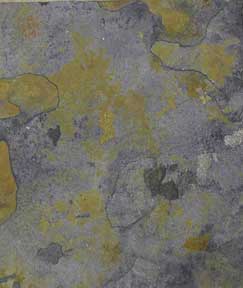
More Pictures & Info
Copper Bathroom Slate Tiles

More Pictures & Info
China Multicolor Slate

More Pictures & Info
Black Gold
Slate For the Bathroom
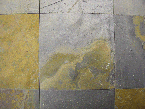
More Pictures & Info
Dessert Storm
A Quartzitic Slate
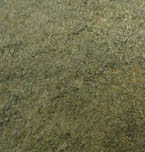
More Pictures & Info
Fantasia Bathroom Slate

More
Pictures & Info
Panther Sandstone
Durable Bathroom Tile

More Pictures & Info
Rainbow Stone
Sandstone Tiles
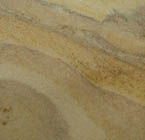
More Pictures & Info
Mountain Black Bathroom Slate

More Pictures & Info
Himalayan Gold
Durable and stain resistant Quartzite
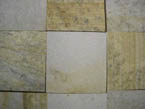
More Pictures & Info
Fossil Stone Bathroom Tiles

More Pictures & Info |










